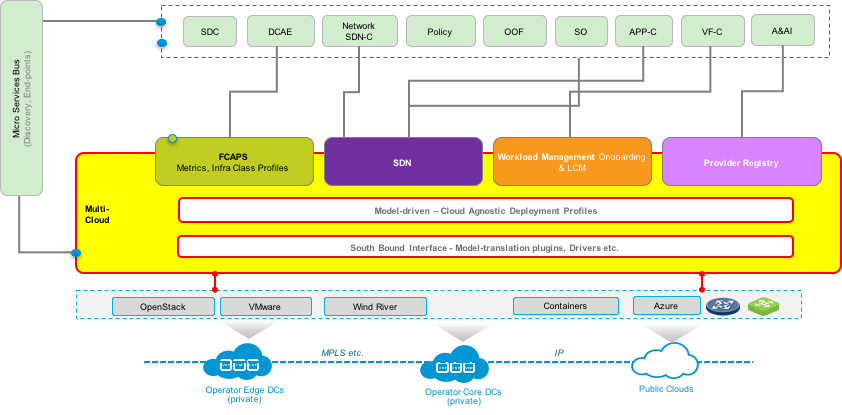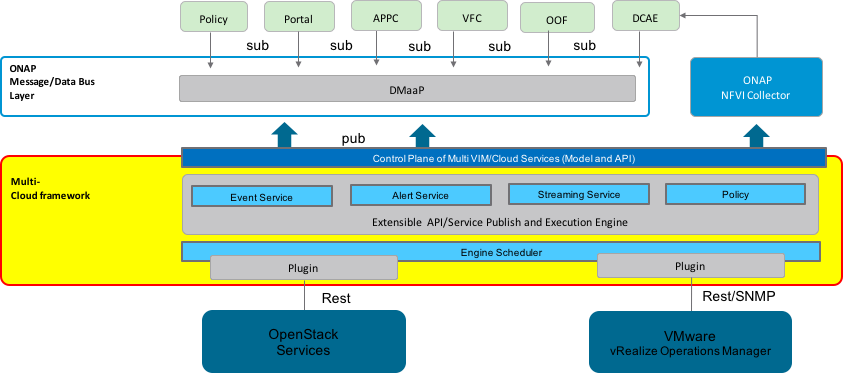...
| Table of Contents | ||
|---|---|---|
|
Overview
| Project Name | Enter the name of the project |
|---|
| Multi VIM/Cloud | Beijing |
| Project Lifecycle State |
| Incubation |
| Participating Company | Amdocs, AT&T, ChinaMobile, Huawei, Intel, Lumina Networks, Microsoft, Mirantis, VMware, WindRiver, ZTE |
Scope
What is this release trying to address?
...
Provide a Cloud Mediation Layer supporting multiple Clouds.
1. Framework Project framework alignment with ONAP R2 S3P goals
2. Transforming towards Model driven
3. Function enhancement as Multi VIM/Cloud mediation layer
Use Cases
Describe the use case this release is targeted for (better if reference to customer use case).
...
1 Event/Alert/Metrics federation
2 Elastic API exposure support
3 Parallelism improvement of Multi Cloud Services
4 Logging EnablementEnabling
5 Standardized Infrastructure Resource Information Model
6 FCAPS management Data Model
Image service
6 Clustering service interfaces for query and placement of a group of resources
7 HPA resource discovery and representation for HPA awareness orchestration7 Image service
Functionalities
List the functionalities that this release is committing to deliver by providing a link to JIRA Epics and Stories. In the JIRA Priority field, specify the priority (either High, Medium, Low). The priority will be used in case de-scoping is required. Don't assign High priority to all functionalities.
Functionality Name | In or Out | Priority | Stretch |
Clustering placement/query | IN | H | Query capacity and status for a group of resources |
Message bus pub/sub | IN and OUT | H | Publish and subscribe events/notification |
Resource Hierarchy graph | IN | H | Traverse resource Hierarchy in given Cloud |
Image upload/download | IN | M | Support upload and download images |
Integration with other project
Functionality Name | In or Out | Priority | Stretch |
| Logging Integration | In | M | Integrate with Logging |
A&AI | In | M | Integrate with A&AI on Image Manager and Resource Modeling |
| OOF | In | H | Integrate with OOF |
| VFC | In | H | Integrate with VFC on VM status part |
| APPC | In | H | Integrate with APPC on VM status part |
| SO | In | H | Integrate with SO on parser adapter |
Epics
Jira server ONAP JIRA columns key,summary,type,created,updated,due,assignee,reporter,priority,status,resolution maximumIssues 20 jqlQuery project = sanbox and issuetype in (epic) MULTICLOUD AND issuetype = Epic AND fixVersion = "Beijing Release" serverId 425b2b0a-557c-3c0c-b515-579789cceedb
...
Jira server ONAP JIRA columns key,summary,type,created,updated,due,assignee,reporter,priority,status,resolution maximumIssues 20 jqlQuery project = sanbox and issuetype in (story) MULTICLOUD AND issuetype = Story AND fixVersion = "Beijing Release" serverId 425b2b0a-557c-3c0c-b515-579789cceedb
...
Indicate at a high level the longer term roadmap. This is to put things into the big perspective.
This release we targeted to implement MVP features and finish regression of all existing use cases. The longer goal is to intergate with different dependent modules to consume the advanced features.
1 Standardized Infrastructure Resource Information Model (Towards model-driven)
2 FCAPS modeling (Towards model-driven)
3 TOSCA-based orchestration to deploy workload on multiple clouds (Towards model-driven)
4 MultiCloud support for Azure (Function enhancement)
Release Deliverables
Indicate the outcome (Executable, Source Code, Library, API description, Tool, Documentation, Release Note...) of this release.
Deliverable Name | Deliverable Description |
| Source Code | Source code for all Multi VIM/Cloud components |
| Docker Containers | Docker container associated componets |
| Documentation | Developer and user documentations |
Sub-Components
List all sub-components part of this release.
Activities related to sub-components must be in sync with the overall release.
Sub-components are repositories and are consolidated in a single centralized place. Edit the Release Components name for your project in the centralized page.
...
Anyone reading this section should have a good understanding of all the interacting modules.
Please refer to below graph for a high level project scope architecture. the Fcaps part will involve data collection and event/metrics/alerts federation part as below graph.
Please refer to below chart for the even-driven framework.
Platform Maturity
Refering to CII Badging Security Program and Platform Maturity Requirements, fill out the table below by indicating the actual level , the targeted level for the current release and the evidences on how you plan to achieve the targeted level.
| Area | Actual Level | Targeted Level for current Release | How, Evidences | Comments |
|---|---|---|---|---|
| Performance | 0 | 1 | show basic performance profiling data in log |
|
| Stability | 0 | 1 | show long run result in log |
|
| Resiliency | 1 | 2 | add Multi VIM service and recovery capability |
|
| Security | 0 | 1 | add CII badge passing tests |
|
| Scalability | 1 | 1 | depends on gepgraphic scaling |
|
| Manageability | 0 | 1 | enable single logging output |
|
| Usability | 2 | 2 | No UI and tutorial documentation need more work |
|
API Incoming Dependencies
...
Prior to the delivery date, it is a good practice to organize an API review with the API consumers.
| API Name | API Description | API Definition Date | API Delivery date | API Definition link (i.e.swagger) |
|---|
Azure API |
southbound API deisgn |
API Outgoing Dependencies
API this project is delivering to other projects.
| API Name | API Description | API Definition Date | API Delivery date | API Definition link (i.e.swagger) |
|---|
Clustering placement/query | Query capacity and status for a group of resources | |||
Message bus pub/sub | Publish and subscribe events/notification | |||
Resource Hierarchy graphs | Traverse resource Hierarchy in given Cloud | |||
| VIM query | Query available VIMs | |||
Image upload/download | Support upload and download images |
Third Party Products Dependencies
Third Party Products mean products that are mandatory to provide services for your components. Development of new functionality in third party product may or not be expected.
List the Third Party Products (OpenStack, ODL, RabbitMQ, ElasticSearch,Crystal Reports, ...).
| Name | Description | Version |
|---|
| Parser Adapter in SO | Translate Tosca template into VIM function description |
In case there are specific dependencies (Centos 7 vs Ubuntu 16. Etc.) list them as well.
...
This section is used to document a limitation on a functionality or platform support. We are currently aware of this limitation and it will be delivered in a future Release.
List identified release gaps (if any), and its impact.
| Gaps identified | Impact |
|---|---|
| To fill out | To fill out |
Known Defects and Issues
Provide a link toward the list of all known project bugs.
| Jira | ||||||||||
|---|---|---|---|---|---|---|---|---|---|---|
|
...
List the risks identified for this release along with the plan to prevent the risk to occur (mitigation) and the plan of action in the case the risk would materialized (contingency).
| Risk identified | Mitigation Plan | Contingency Plan |
|---|
| APPC event integration | keep the existing way | work together on vm polling part of code |
| OOF event integration | keep the existing way | work together on Clustering query and resource graphs update |
| DCAE integration | keep the existing way | identify examples of alert/metrics |
| AAI integration | keep the existing way | identify examples of HPA |
Resources
Fill out the Resources Committed to the Release centralized page.
Release Milestone
...
It is not expected to have a detailed project plan.
| Date | Project | Deliverable |
|---|---|---|
| To fill out | To fill out | To fill out |
Documentation, Training
- Highlight the team contributions to the specific document related to he project (Config guide, installation guide...).
- Highlight the team contributions to the overall Release Documentation and training asset
- High level list of documentation, training and tutorials necessary to understand the release capabilities, configuration and operation.
- Documentation includes items such as:
- Installation instructions
- Configuration instructions
- Developer guide
- End User guide
- Admin guide
- ...
...


